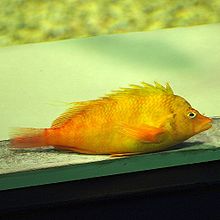Cirrhitichthys aureus
| Cirrhitichthys aureus | |
|---|---|

| |
| Scientific classification | |
| Domain: | Eukaryota |
| Kingdom: | Animalia |
| Phylum: | Chordata |
| Class: | Actinopterygii |
| Order: | Centrarchiformes |
| Family: | Cirrhitidae |
| Genus: | Cirrhitichthys |
| Species: | C. aureus
|
| Binomial name | |
| Cirrhitichthys aureus | |
| Synonyms[1] | |
| |
Cirrhitichthys aureus, the yellow hawkfish, the golden hawkfish or golden curlyfin, is a species of marine ray-finned fish, a hawkfish belonging to the family Cirrhitidae. It is native to tropical reefs of the Indian Ocean and the western Pacific Ocean.
Taxonomy
[edit]Cirrhitichthys aureus was first formally described in 1842 as Cirrhites aureus by Coenraad Jacob Temminck and Herman Schlegel with the type locality given as the outer bays of Nagasaki.[1] The specific name aureus means “gold”, a reference to its golden yellow colour.[2]
Description
[edit]Cirrhitichthys aureus has a dorsal fin which contains 10 spines and 12 soft rays,[3] the first soft ray is extended.[4] The anal fin has 3 spines and 6 soft rays.[3] The pelvic fin extends past the anus and the caudal fin is weakly emarginate.[4] This species reaches a maximum total length of 14 cm (5.5 in).[3] The overall colour is yellow to orange with large, indistinct, dusky brown blotches along the back. There is a pair of poorly defined brown spots just above the gill cover. The fins are yellowish in colour with spots on the soft rayed part of the dorsal fin.[3]
Distribution and habitat
[edit]Cirrhitichthys aureus is found in the Indo-Pacific region from India east to Japan and China, it has also been recorded in southern Indonesia.[3] Thus species is found around rocky cliffs within reefs and is found at depths between 5 and 20 m (16 and 66 ft).[5]
Biology
[edit]Cirrhitichthys aureus have been shown, at least in captivity, to be able to change sex in either direction. They lay pelagic eggs.[3] Their diet is made up of fishes and crustaceans.[5] In the wild these fish are largely solitary.[6]
Utilisation
[edit]Cirrhitichthys aureus are not often collected for the aquarium trade.[5][6]
References
[edit]- ^ a b Eschmeyer, William N.; Fricke, Ron & van der Laan, Richard (eds.). "Species in the genus Cirrhitichthys". Catalog of Fishes. California Academy of Sciences. Retrieved 12 July 2021.
- ^ Christopher Scharpf & Kenneth J. Lazara, eds. (25 February 2021). "Order CENTRARCHIFORMES: Families CENTRARCHIDAE, ELASSOMATIDAE, ENOPLOSIDAE, SINIPERCIDAE, APLODACTYLIDAE, CHEILODACTYLIDAE, CHIRONEMIDAE, CIRRHITIDAE, LATRIDAE, PERCICHTHYIDAE, DICHISTIIDAE, GIRELLIDAE, KUHLIIDAE, KYPHOSIDAE, OPLEGNATHIDAE, TERAPONTIDAE, MICROCANTHIDAE and SCORPIDIDAE". The ETYFish Project Fish Name Etymology Database. Christopher Scharpf and Kenneth J. Lazara. Retrieved 10 July 2021.
- ^ a b c d e f Froese, Rainer; Pauly, Daniel (eds.). "Cirrhitichthys aureus". FishBase. June 2021 version.
- ^ a b Randall, J. E. (1963). "Review of the hawkfishes (family Cirrhitidae)". Proceedings of the United States National Museum. 114 (3472): 389–451.
- ^ a b c "Cirrhitichthys aureus". Saltcorner. Bob Goemans. Retrieved 12 July 2021.
- ^ a b "CIRRHITICHTHYS AUREUS". De Jong Marine Life. Retrieved 12 July 2021.
